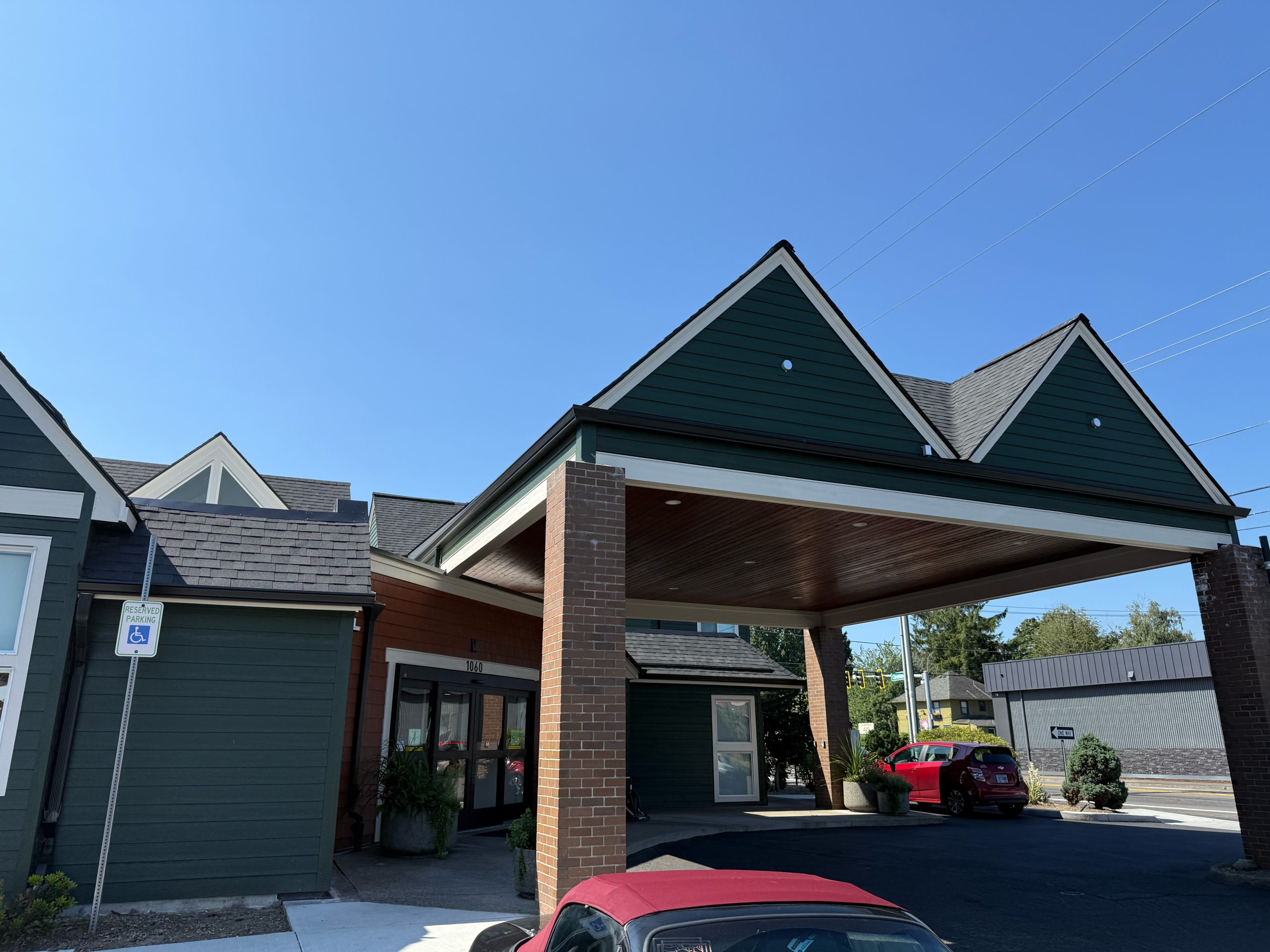
How an old hotel shows one solution to community college student housing insecurity
GRESHAM, Ore. — When Ken Perez was 24, he quit his construction job and moved back in with his parents so he could give college another try.
He chipped in on some bills, but it was otherwise free housing, allowing him to devote himself to the video production classes he was taking at Gresham’s Mt. Hood Community College. It was his second go-around at Mt. Hood — he went one term right after high school. This time, he was ready to take school more seriously.
Then an electrical fire made his family home unlivable, forcing him, his parents and his older sister to move into a rental. Distressed, Perez struggled to find peace and calm in the unfamiliar space and considered dropping out again, until he learned about a promising new place for local college students to live.
This place, tucked behind a Swiss-German restaurant called Heidi’s Delicious Food Lounge and across the street from Dragon Palace Restaurant, is an almost 40-year-old building that’s been given new life. What was first the Pony Soldier Inn, and later the Ponderosa Inn, was bought by a nonprofit in 2023 and reincarnated as Abigail Court, an affordable housing complex with 75 studio apartments for college students.
Perez, who moved in last February, finally had a place he could call home. He shares it with his girlfriend, who is also a student, and a tiny, butterscotch-colored terrier named Tila, an emotional support pet he adopted to help him cope after the fire. They pay $950 per month, while the average rent for a studio apartment in Gresham costs about $400 more than that, according to Zillow.
Related: Interested in more news about colleges and universities? Subscribe to our free biweekly higher education newsletter.
The two-story hotel-turned-apartment complex is addressing one of the fastest-growing problems in higher education: rising housing costs and housing insecurity among college students.

“We see that the cost of housing — whether that’s rent or room and board or whatever housing arrangements — tends to be the highest cost that students face, even higher than tuition in many cases, particularly at community colleges,” said Mark Huelsman, the director of policy and advocacy at the Hope Center for Student Basic Needs, a research and policy organization based at Temple University.
Though student housing is often thought of as an issue at four-year colleges, finding and keeping a place to live can be a particular challenge for community college students — many of whom come from low-income backgrounds and don’t have family financial support, or have children or other caretaking responsibilities.
College and community leaders across the country are wrestling with the problem. In Tacoma, Washington, the local housing authority tested giving vouchers to housing-insecure students at a local community college. In college towns including Berkeley, California; Austin, Texas; and Syracuse, New York, students live in shared off-campus co-op houses, where they pay monthly dues to cover the mortgage, taxes, insurance and groceries.
About half of all community college students experienced some form of housing insecurity in the past year, according to recent survey data from the Hope Center. That could mean that they’ve struggled to pay rent or utilities, have been summoned to appear in housing court, have lived in an overcrowded house or apartment or had to move in with others because of financial problems.
The same survey, from 2023-24, found that about 15 percent of community college students had experienced homelessness in the previous year. The survey’s definition of homelessness was fairly broad: students who reported being homeless, sleeping outdoors or sleeping in a vehicle or in temporary housing including shelters, hotels (not for vacation) or group homes.
In the Portland area, the need for housing among students is so great that when Abigail Court’s community manager Steven Larkin recently listed one apartment, it had nine applicants within 20 minutes.
“I wish we had a third floor, I really do. But unfortunately not,” Larkin said. “There’s definitely a big, massive need in this area.”

Abigail Court is a project of College Housing Northwest, a nonprofit that works on cutting student expenses by offering low-cost housing in the Portland metro area. The organization, which owns six buildings in the area, rents to roughly 1,000 students who are enrolled at least half-time in college, trade schools or online programs. It doesn’t require an extensive credit history or a co-signer. Abigail Court, which opened last fall, is a 12-minute bus ride from Mt. Hood Community College.
At Mt. Hood, which serves urban and rural communities east of Portland, 3 in 5 students experience housing instability and 1 in 5 experience homelessness, according to a 2024 survey by the college.
Bhaktirose Dawdy, the college’s director of student basic needs initiatives, said it has become clear not only that there’s a significant need for low-cost student housing, but that all kinds of students would benefit.
That includes athletes, straight-A students and students pursuing medical careers who have in-person clinical requirements, as well as students who moved from more rural areas but cannot keep up with higher rent in the more urban area, Dawdy said.
Dawdy, who has spent much of her career working with homeless youth, said she recalls daydreaming about a place where young people could live while they got an education: At first they would pay nothing, but work up to paying rent as they found stability. It was a lofty idea she’d discuss with co-workers. Now, seeing it in action, she believes this solution will help keep people from needing public benefits in the future.
Related: A surprising reason keeping students from finishing college: A lack of transportation
Linda García, executive director at the Center for Community College Student Engagement at the University of Texas at Austin, said community college students can be derailed by obstacles unrelated to academics, including basic needs insecurity.
“Students are bringing their hopes, aspirations and dreams along that journey, but to get to that finish line, they have hurdles that they have to jump through,” García said. “Some of those hurdles could be experiences that they have on campus, or maybe it’s experiences that they’re having off campus that are preventing them from moving forward.”
In Portland, the cost of living is now 17 percent higher than the national average, according to Payscale, a salary data website, making it difficult to afford even for college students who also work. Abigail Court is just outside Portland in Gresham, where the cost of living is about 6 percent higher than the national average, Payscale shows.

Ash Perrine, 33, said most of their education at Portland Community College is covered by a Pell Grant and scholarships. They were progressing toward a degree in addiction counseling, they said, until the beginning of this year, when they had a falling-out with roommates. They stayed with friends, in a hotel and in their truck and postponed the internship portion of their program because of the stress of their living situation, they said.
After about six weeks, Perrine learned about College Housing Northwest and moved into Abigail Court — about a 45-minute bus ride to the PCC Southeast campus with no transfers.
“Having the stability of housing really means I can exceed at my studies rather than just try and get by,” Perrine said. “I know where I’m going every evening, and I can save my mental effort for, you know, making an excellent midterm presentation.”
Related: Couch surfing, living in cars: Housing insecurity derails foster kids’ college dreams
College Housing Northwest used a $6 million state housing grant to buy the old Pony Soldier Inn. It spent another $1.6 million in grant money to gut and remodel it into Abigail Court, said Alex Wallace, real estate development manager at CHNW.
Huelsman, of the Hope Center, said that there’s a great need around the country to develop long-term solutions like Abigail Court, as well as short-term solutions for students who need help to get them off the streets for a few nights. Both kinds of solutions can be costly.
“For colleges, it can be hard to figure out how to prioritize resources,” Huelsman said. “Do you put resources towards helping students who literally don’t have anywhere to live and are sleeping in their cars or couchsurfing, and providing interventions to help them? Or, are you putting resources towards making it so more students in the future will have access to housing?”
The Tacoma Housing Authority housing vouchers program ran from 2014 to 2021, when officials decided they could better “improve access to housing resources for students and their families by investing in existing systems rather than creating brand-new programs,” according to the housing authority’s website.
The co-op model being tried in many college towns across the country provides low-cost housing in an entirely different way, said Syd Burke, the director of community engagement for the North American Students of Cooperation. Instead of renting, students technically own a share of the place where they’re living, though they don’t own their room or unit outright. The homes or dorm-style buildings are governed by a board, and everyone who lives there can vote on big decisions, Burke said.
The association, known as NASCO, supports 34 co-op systems nationwide. NASCO asks that co-ops be within commuting distance from a college or university without specifying how close. And the co-ops do not always require that all residents be college students, Burke said.
NASCO has one member co-op in Oregon, in Eugene, about a 2.5-hour drive south of Portland, best suited to serve students at the University of Oregon or Lane Community College.
Related: Do-it-yourself mental health efforts by community college students
Along with residences like Abigail Court, College Housing Northwest also offers the Affordable Rents for College Students program, which cuts rent even more or altogether. Many of its buildings have food pantries, too.
Valerie Micohn, 19, who moved into Abigail Court in late April, said the food pantry helped her make ends meet before she landed a job in early August.

Micohn, a student at Mt. Hood Community College, didn’t expect to be on her own at 19, but living with family and roommates had become tense and uncomfortable. When one of her professors mentioned housing opportunities with CHNW, Micohn jumped at the chance.
Being in college has allowed Micohn to explore new aspects of her identity and realize that she’s transgender. Having her own apartment has given her space to settle into this newly discovered part of herself, she said.
And she’s discovered other joys that come with independence.
“I know it’s the smallest thing, but just being able to put on music and dance in the middle of your own apartment, it’s a very freeing feeling,” she said. “I never really got to feel that.”
Larkin said he’s working to make Abigail Court feel like a community for all residents, posting information about free activities and resources on a laundry room bulletin board. He regularly hosts events, including a grab-and-go breakfast during finals week, craft nights and a little carnival at the end of July.
Perez finished his associate degree in video production at Mt. Hood Community College at the end of the spring semester and will begin studying film at Portland State University in late September. Although it’s about an hour away depending on traffic, Perez said there’s a good chance he’ll stay at Abigail Court anyway.
It’s been a lifeline, he said. And based on what he’s heard from his neighbors’ descriptions of histories of unstable or unaffordable living situations, he believes it has been one for them, too.
Contact staff writer Olivia Sanchez at 212-678-8402 or osanchez@hechingerreport.org.
This story about student housing insecurity was produced by The Hechinger Report, a nonprofit, independent news organization focused on inequality and innovation in education. Sign up for the Hechinger newsletter.
Source link



